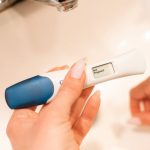Ectopic pregnancy (also called extra-uterine pregnancy) is when a fertilized egg grows outside your uterus. This can include other areas like a fallopian tube, the ovaries in your belly, or the lower part of your cervix, which is above the vagina. In more than 90% of cases, the egg attaches itself to a fallopian tube.
This is called a tubal pregnancy. As the fertilized egg grows, it can burst (rupture), which causes life-threatening bleeding. If this happens, you will need medical help right away. Ectopic pregnancy is the leading cause of pregnancy-related deaths in the first trimester.
SIGNS AND SYMPTOMS OF ECTOPIC PREGNANCY
Symptoms of ectopic pregnancy usually develop fairly early in the pregnancy, between the 4th and 12th weeks. At first, you may not have symptoms of early ectopic pregnancy. They may seem very similar to those of a normal pregnancy. Only about half of women with ectopic pregnancies will have all three of the main signs a missed period, vaginal bleeding, and belly pain.
Early signs of ectopic pregnancy may include the following:
- Stomach upset and vomiting
- Pain on one side of your body
- Dizziness or fainting
- Pain in your shoulder, neck, or rectum
- Emergency symptoms include major pain with or without severe bleeding.
RISK FACTORS OF ECTOPIC PREGNANCY
- A tubal pregnancy, the most common type of ectopic pregnancy, happens when a fertilized egg gets stuck on its way to the uterus, often because the fallopian tube is damaged by inflammation.
- Hormonal imbalances or abnormal development of the fertilized egg might also play a role.
- It could also happen if you become pregnant while using an intrauterine device (IUD) for birth control.
- Had a previous pregnancy: If you’ve had this type of pregnancy before, you’re more likely to have another
- Had fertility treatment such as IVF(in vitro fertilization
- Tried to have a tubal ligation (tubes tied) or tubal ligation reversal for birth control.
- Sexually transmitted infections: gonorrhea or chlamydia can cause inflammation in the tubes and nearby organs. And it increases your risk of ectopic pregnancy
- SMOKING: Cigarette smoking just before you get pregnant can increase the risk of an ectopic pregnancy. The more you smoke, the greater the risk.
COMPLICATIONS
During an ectopic pregnancy, the fertilized egg is wrapped in a structure that can grow for several weeks outside your uterus. But the structure usually bursts between 6 and 16 weeks. A ruptured ectopic pregnancy can cause severe bleeding. If the bleeding isn’t stopped, your body might start to shut down due to blood loss (hemorrhagic shock), and the odds of dying from it increase.
If it’s treated before it bursts, it rarely results in death. If the structure does not burst, it may damage the fallopian tube it was attached to. Your fallopian tube might be removed during the surgery. Since you have two fallopian tubes, if your other fallopian tube is healthy, you should still be able to get pregnant.
But if your fallopian tube is not there or damaged, you may have fertility issues.






